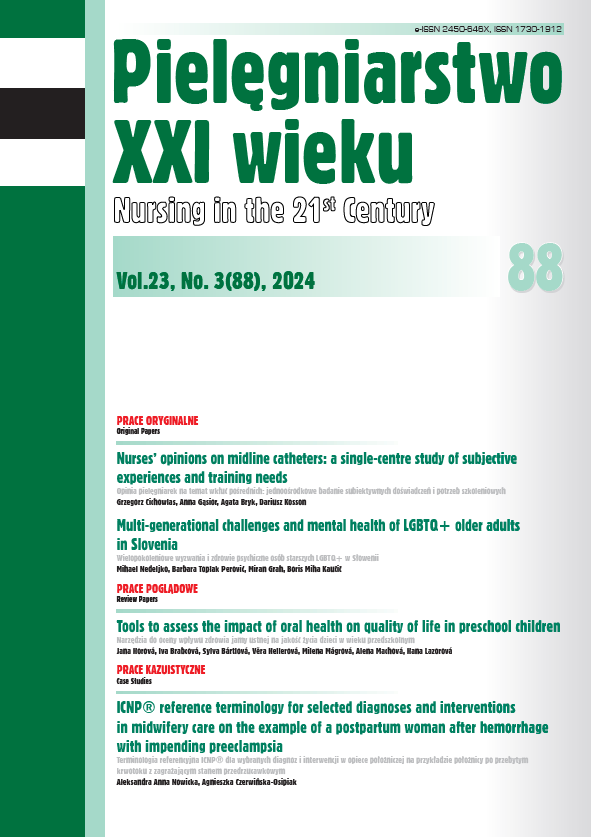Późne następstwa psychiczne u osób po COVID-19
DOI:
https://doi.org/10.2478/pielxxiw-2024-0039Słowa kluczowe:
COVID-19, zdrowie psychiczne, kwarantanna, metapoznanie, dystresAbstrakt
PÓŹNE NASTĘPSTWA PSYCHICZNE U OSÓB PO COVID-19
Cel pracy. Celem pracy było zbadanie długoterminowych skutków psychicznych u pacjentów, którzy przeszli COVID-19, oraz osób poddanych kwarantannie. Przeanalizowano różnice w zakresie przekonań metapoznawczych oraz ogólnego stanu zdrowia psychicznego, aby ocenić ich wpływ na pojawienie się dystresu psychicznego.
Materiał i metody. W badaniu wzięły udział 122 osoby, w tym pacjenci po COVID-19 oraz osoby przebywające na kwarantannie. Do oceny stanu psychicznego wykorzystano kwestionariusze Metacognitive Questionnaire (MCQ) oraz General Health Questionnaire (GHQ-12), które dostarczyły danych na temat przekonań metapoznawczych oraz ogólnego stanu zdrowia psychicznego.
Wyniki. Wyniki wykazały, że pacjenci po COVID-19 częściej zgłaszali pozytywne przekonania dotyczące zamartwiania się (MCQ1), natomiast osoby na kwarantannie miały wyższe wyniki w zakresie samoświadomości poznawczej (MCQ5) oraz negatywnych przekonań o braku kontroli nad myślami (MCQ4).
Wnioski. W obu grupach stwierdzono podobny poziom ogólnego dystresu psychicznego, co sugeruje, że pandemia miała szeroki wpływ na zdrowie psychiczne, niezależnie od bezpośredniego kontaktu z chorobą. Zarówno pacjenci po COVID-19, jak i osoby na kwarantannie wymagają wsparcia psychologicznego, aby przeciwdziałać negatywnym skutkom psychicznym pandemii. Interwencje terapeutyczne, takie jak terapia poznawczo-behawioralna i techniki mindfulness, mogą pomóc w zarządzaniu stresem oraz ruminacjami.
Bibliografia
1. Sudre CH, Murray B, Varsavsky T, et al. Attributes and predictors of long COVID. Nat. Med. 2021;27(4):626-631. https://doi.org/10.1038/s41591-021-01292-y.
2. Mazza MG, De Lorenzo R, Conte C, et al. Anxiety and depression in COVID-19 survivors: Role of inflammatory and clinical predictors. Brain. Behav. Immun. 2020;89:594-600. https://doi.org/10.1016/j.bbi.2020.07.037.
3. Carfi A, Bernabei R, Landi F, et al. Persistent symptoms in patients after acute COVID-19. JAMA. 2020;324(6):603-605. https://doi.org/10.1001/jama.2020.12603.
4. Rogers JP, Watson CJ, Badenoch J, et al. Neurology and neuropsychiatry of COVID-19: a systematic review and meta-analysis of the early literature reveals frequent CNS manifestations and key emerging narratives. J. Neurol. Neurosurg. Psychiatry. 2020;91(10):1169-1176. https://doi.org/10.1136/jnnp-2020-324486.
5. Taquet M, Geddes JR, Husain M, et al. 6-month neurological and psychiatric outcomes in 236 379 survivors of COVID-19: a retrospective cohort study using electronic health records. Lancet Psychiatry. 2021;8(5):416-427. https://doi.org/10.1016/S2215-0366(21)00084-5.
6. Halpin SJ, McIvor C, Whyatt G, et al. Postdischarge symptoms and rehabilitation needs in survivors of COVID-19 infection: A cross-sectional evaluation. J. Med. Virol. 2021;93(2):1013-1022. https://doi.org/10.1002/jmv.26368.
7. Kempuraj D, Selvakumar GP, Ahmed ME, et al. COVID-19, mast cells, cytokine storm, anxiety, and psychological distress: How it can impact mental health and aggravate psychiatric conditions?. Eur. Rev. Med. Pharmacol. Sci. 2020;24(18):9151-9162. https://doi.org/10.26355/eurrev_202009_22935.
8. Tomasoni D, Bai F, Castoldi R, et al. Anxiety and depression symptoms after virological clearance of COVID-19: A cross-sectional study in Milan, Italy. J. Med. Virol. 2021;93(2):1175-1179. https://doi.org/10.1002/jmv.26459.
9. Moreno C, Wykes T, Galderisi S, et al. How mental health care should change as a consequence of the COVID-19 pandemic. Lancet Psychiatry. 2020;7(9):813-824. https://doi.org/10.1016/S2215-0366(20)30307-2.
10. Alonso J, Vilagut G, Mortier P, et al. Mental health impact of the first wave of COVID-19 pandemic on Spanish healthcare workers: A large cross-sectional survey. Rev. Psiquiatr. Salud. Ment. 2021;14(2):90-105. https://doi.org/10.1016/j.rpsm.2020.12.001.
11. Williams P, Merecz D, Goldberg DP, i wsp. Ocena zdrowia psychicznego na podstawie badań kwestionariuszami Davida Goldberga: podręcznik dla użytkowników kwestionariuszy GHQ-12 i GHQ-28. [w:] Instytut Medycyny Pracy im prof dr med Jerzego Nofera (Łódź). Łódź: Oficyna Wydawnicza IMP; 2001, s. 1-112.
12. Benedetti F, et al. Neuroinflammation in COVID-19 patients: A systematic review. J. Neuroinflammation. 2021;18(1):1-17. DOI: 10.1186/s12974-021-02212-8.
13. Ceban F, et al. Fatigue and cognitive impairment in Post-COVID-19 Syndrome: A systematic review and meta-analysis. Brain Behav. Immun. 2022;101:93-135. DOI: 10.1016/j.bbi.2021.12.020.
14. Huang C, et al. 6-month consequences of COVID-19 in patients discharged from hospital: A cohort study. Lancet. 2021;397(10270):220-232. DOI: 10.1016/S0140-6736(20)32656-8.
15. Vindegaard N, Benros ME. COVID-19 pandemic and mental health consequences: Systematic review of the current evidence. Brain Behav. Immun. 2020;89:531-542. DOI: 10.1016/j.bbi.2020.05.048.
16. Guo Q, Zheng Y, Shi J, et al. Immediate psychological distress in quarantined patients with COVID-19 and its association with peripheral inflammation: A mixed-method study. Brain Behav. Immun. 2020;88:17-27. https://doi.org/10.1016/j.bbi.2020.05.038.
17. Brooks SK, et al. The psychological impact of quarantine and how to reduce it: Rapid review of the evidence. Lancet. 2020;395(10227):912-920. DOI: 10.1016/S0140-6736(20)30460-8.
18. Shevlin M, et al. Anxiety, depression, traumatic stress and COVID-19-related anxiety in the UK general population during the COVID-19 pandemic. BJPsych. Open. 2020;6(6). DOI: 10.1192/bjo.2020.109.
19. Morin CM, et al. Persistent insomnia and cognitive impairment in COVID-19 survivors: A 6-month follow-up study. J. Clin. Sleep. Med. 2021;17(6):1141-1150. DOI: 10.5664/jcsm.9196.
Pobrania
Opublikowane
Numer
Dział
Licencja
Prawa autorskie (c) 2024 Autorzy

Utwór dostępny jest na licencji Creative Commons Uznanie autorstwa 4.0 Międzynarodowe.




